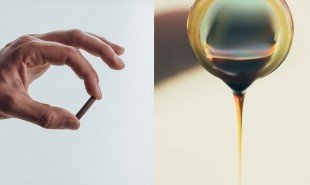
It’s often the case that the best ideas come when we’re not actively looking for it. This was true for Arthur Kay, founder and CEO of bio-bean, a company that upcycles waste coffee grounds into energy pellets and fuel. As he told the Guardian, when he was studying architecture at UCL looking at closed loop waste-to-energy systems for buildings, he happened to choose a coffee shop as his subject. His idea for the company materialized when he found out about the oil content in coffee and the amount of waste produced — 200,000 tonnes a year in London alone.
So he started bio-bean. The company collects coffee grinds from high street coffee shops, roasters and freeze-dried coffee facilities around London, and transports it to their plant in Cambridgeshire. The factory then turns the waste coffee grinds into bio-diesel and bio-mass pellets — their patented biochemical process uses a solvent that they evaporate through the beans to extract oil from it. Coffee grinds are about 15-20 percent oil, and the remaining 80-85 percent is turned into bio-mass pellets to be burned in boilers. The solvent is also 99.9 percent recyclable, so it can be used again and again.
Raising over GBP 2 million financing in just two years, the company now employs a team of over 20 people, including one of the only people in the UK with a PhD in bio-mass pelleting. “Our expertise in the green energy sector is constantly expanding,” bio-bean tells us.
Though we have covered plenty of innovative businesses that offer green energy alternatives, what excited us about bio-bean was the scale of its operation. Since we wrote about bio-bean at the start of this year, they have commissioned and built a 20,000 sq ft upscaled waste coffee grounds recycling factory, which has the capacity to process 50,000 tonnes of waste coffee grounds each year. “This is an important milestone and means that we will be recycling one out of every ten cups of coffee consumed in the UK!”

They also now operate comprehensive collection services, which are extremely easy for coffee waste producers of every size to join — all they need to do is contact bio-bean and sign up. “Our service represents a saving on conventional coffee waste disposal routes, not to mention [the] huge environmental advantages.”
Both Arthur and COO Benjamin Harriman come from architectural backgrounds and had little entrepreneurial experience prior to bio-bean. The pair faced challenges in building their new business, but they also found parallels in the two disciplines that proved to be useful. Fundamentally, the crossover lies in their interest in designing sustainable cities — making use of waste streams in urban centers is a key component to the sustainability and economic growth of a city.
“Any business is a phenomenal learning curve for its founders. However, coffee is something that drives our cities. Consumers and businesses seem to appreciate the idea, recognize the problem and want to be involved in our solution.” It’s hard to not want to, when bio-bean defines itself as a “worldfirst” business that saves money and creates local, sustainable green energy.

They also received a number of awards and accolades in their initial growth phase, which helped speed up the development. “Starting a project like bio-bean is a rush of enthusiasm,” they say. “[But] the development is far more complex and requires serious determination and rigor. bio-bean has to interface with large corporations and established processes and this requires more than a simple good idea.”
One initial challenge faced by the team was the problem of scale. Often businesses producing green energy start small, but this means that their impact takes a long time to grow. “Many people think of us collecting waste coffee grounds from a local coffee shops,” they tell us, “But once we recognized the scale of the problem, we needed to come up with an industrial-scale solution. This evolution of the business creates numerous challenges that our team delight in solving.”
They have recently completed their demonstration plant at Alconbury Weald, Cambridgeshire, and are in discussion about building further plants located near other urban centers. “2015 sees the growth of our recycling capacity, domestic expansion and exploring the potential to expand internationally.”
In the grand scheme of things, bio-bean sees itself as a integral part of the circular economy. “biobean is an extraordinary company that I’m proud to be a part of,” Arthur tells us, “We see ourselves inspiring other young people to build sustainable urban design into their lives and careers. It feels to me that the future of cities and how they are designed strongly affects the future of our shared world.”
You can find out more about bio-bean here.




